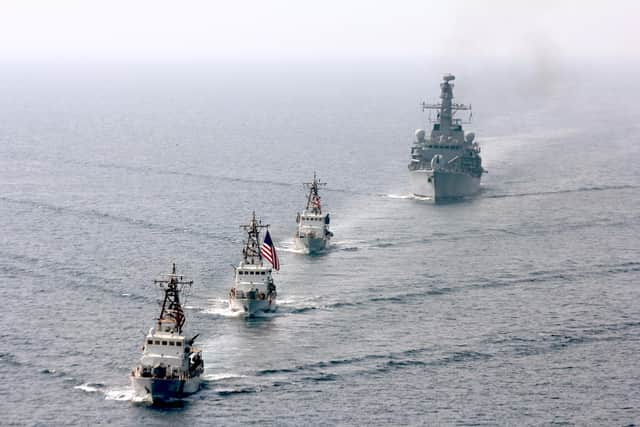Royal Navy protects hundreds of ships carrying Christmas presents in the Gulf from attack
This article contains affiliate links. We may earn a small commission on items purchased through this article, but that does not affect our editorial judgement.
and live on Freeview channel 276
More than 200 vessels a month, carrying hundreds of millions of tonnes of goods, have safely navigated the Gulf this autumn under the watchful eyes of a Royal Navy-led task force.
The naval force, known as Operation Sentinel, is run from its base in Bahrain and is designed to safeguard waters at two key hotspots in the Gulf - the Strait of Hormuz and Bab-el-Mandeb.
Advertisement
Hide AdAdvertisement
Hide AdShould either route become blocked or unsafe for merchant shipping the impact on the UK alone – which relies on regular supplies of liquid natural gas from the Gulf – would be severe.


In spring the accidental blockage of the Suez Canal by container ship the Ever Given cost global trade more than £280m per hour, or £6bn per day.
Supported by sailors from Portsmouth and Senior Service warships - including frigate HMS Montrose and Portsmouth-based minehunter HMS Middleton - it is the task group’s job to bodyguard merchant ships and defend them from attack.
The task group uses a combination of small and major warships from the participating navies to monitor daily goings-on and watch over shipping.
Advertisement
Hide AdAdvertisement
Hide AdAs well as providing support at sea, Operation Sentinel also tasks maritime patrol aircraft and helicopters to monitor the Gulf from the sky, with aircraft flying more than 3,300 hour of patrols – more than 19 weeks in the air.
The mission was directed by Commodore Gordon Ruddock, who was at the helm of the operation for four months.
He has since handed over to the latest Royal Navy officer to take charge of Sentinel since its inception in November 2019, Commodore Don Mackinnon.
Cdre Mackinnon said: ‘Now, more than ever, it is vital we develop new and innovative ways to deliver the mission of deterrence and reassurance.
Advertisement
Hide AdAdvertisement
Hide Ad‘This coalition was built on a strong foundation of co-operation and each member of the International Maritime Security Construct will remain vigilant.’
Cdre Mackinnon told the Sentinel staff he relished the coming challenge.
Looking for the latest Royal Navy updates from Portsmouth? Join our new Royal Navy news Facebook group to keep up to date.
A message from the Editor, Mark Waldron
You can subscribe here for unlimited access to our online coverage, including Pompey, with 70 per cent fewer adverts for less than 20p a day.
Comment Guidelines
National World encourages reader discussion on our stories. User feedback, insights and back-and-forth exchanges add a rich layer of context to reporting. Please review our Community Guidelines before commenting.
